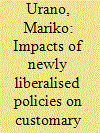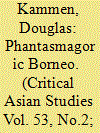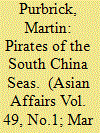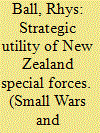|
|
|
Sort Order |
|
|
|
Items / Page
|
|
|
|
|
|
|
| Srl | Item |
| 1 |
ID:
146231


|
|
|
|
|
| Summary/Abstract |
This paper uses recently-released material from the ‘migrated archives’ to provide an original counterinsurgency analysis of the TNKU revolt in Brunei and Sarawak from December 1962 to May 1963. It argues that, despite a failure to act upon intelligence predicting the outbreak of insurgency, Britain developed a highly effective counterinsurgency organisation. These records also indicate that decision-makers drew inspiration from the Malayan Emergency to inform success in Brunei. Although Malaya has been challenged as a counterinsurgency paradigm, the Brunei operations show the utility of striking a balance between inappropriately copying from past campaigns and developing best practices applicable to the unique environment of Borneo. In turn, the evolution of effective operational practices in Brunei informed their successful application to the subsequent Indonesian Confrontation.
|
|
|
|
|
|
|
|
|
|
|
|
|
|
|
|
| 2 |
ID:
192686


|
|
|
|
|
| Summary/Abstract |
In the early 1960s, as the Federation of Malaysia was being established, Britain joined Southeast Asian allies in an undeclared war in Borneo against Indonesia. This struggle was waged most visibly on the borders of Malaysian Borneo, notably in the state of Sarawak, but the British military was ever mindful of the internal threat from a growing communist network. This aspect of the 1962–1966 “Confrontation” has largely gone unstudied; historiography has focused on the external conflict. While the military was not central to the campaign against internal subversion, its assessment of the problem is central to a real understanding of the campaign as a whole.
|
|
|
|
|
|
|
|
|
|
|
|
|
|
|
|
| 3 |
ID:
132403


|
|
|
|
|
| Publication |
2014.
|
| Summary/Abstract |
Based on interviews and participant observation conducted in the province of East Kalimantan, Indonesia, from 2008 to 2012, this paper examines why the agrarian reforms have failed to secure the land rights of local farmers. Since the fall of the authoritarian government in 1998, Indonesia has seen limited, but growing government recognition of customary land rights of local farmers living in forest areas. I present a case study of two villages, in which the greater discretion on the part of the local community to negotiate with large-scale oil palm estates has led to the abuse of power by local elites, as well as territorial tensions between local communities. The finding questions the optimistic view that state recognition of customary land rights of communities would automatically lead to the security of landownership of local farmers, and its underlying image of harmonious local communities in which members share coherent interests. The agrarian reform that has centred on communities' rights of control over land and natural resources is problematic. When local communities do not possess capabilities for resolving conflicts in an equitable and transparent manner, third-party intervention is needed to assist communities to strengthen local land rights.
|
|
|
|
|
|
|
|
|
|
|
|
|
|
|
|
| 4 |
ID:
129475


|
|
|
|
|
| Publication |
2013.
|
| Summary/Abstract |
Community development in the border areas of Indonesia have not received sufficient government attention, despite being a strategic area and a reflection of a country's front line. The focus of this article is the National Community Empowerment Program in the rural border area of West Borneo Previous studies have indicated various impacts to the border area welfare, such as the rise of unemployment within communities, difficulty in gaining access to food sources, increase in the consumptive nature of the people, heightening of criminal cases, decrease of the quality of environment, and the rising presence of patrons and clients. If this issue is left unresolved, the community will surely face increasingly complex conditions.
|
|
|
|
|
|
|
|
|
|
|
|
|
|
|
|
| 5 |
ID:
135063


|
|
|
|
|
| Publication |
New Delhi, Asian Educational Service, 2006.
|
| Description |
73p.Hbk
|
| Contents |
Old Publication
|
| Standard Number |
8120605616
|
|
|
|
|
|
|
|
|
|
|
|
Copies: C:1/I:0,R:0,Q:0
Circulation
| Accession# | Call# | Current Location | Status | Policy | Location |
| 057974 | 934/BAN 057974 | Main | On Shelf | General | |
|
|
|
|
| 6 |
ID:
148046


|
|
|
|
|
| Summary/Abstract |
This article evaluates the performance of the Special Air Service (SAS) during secret cross-border raids conducted as part of Britain’s undeclared war against Indonesia from 1963–1966. The analysis reviews the existing debate on the SAS’ performance during this campaign; it looks more closely at how military effectiveness might be defined; and it then examines, using the SAS’ own operations reports, the nature of their activities and their success or failure. This article concludes that critics of the SAS’ effectiveness during Confrontation are right; but for the wrong reasons. SAS operations did indeed have less effect than orthodox accounts would have it. But the reasons for this lay not in their misuse but in the exigencies of British strategy. This article demonstrates an enduring truth – no matter how ‘special’ a military force might be, tactical excellence cannot compensate reliably for problems in strategy.
|
|
|
|
|
|
|
|
|
|
|
|
|
|
|
|
| 7 |
ID:
104130


|
|
|
|
|
| Publication |
2011.
|
| Summary/Abstract |
This article examines the energy security implications of the Sarawak Corridor of Renewable Energy in Malaysia (SCORE), a US$105 billion infrastructure development plan in Sarawak on the island of Borneo. SCORE aims to build a series of hydroelectric dams along a 320-kilometer corridor by 2030. The article begins by explaining the methodology utilized for its research interviews and site visits. It goes on to argue that energy security in Southeast Asia should consist of simultaneously improving the availability, affordability, efficiency and stewardship of energy services for end users. Availability involves diversifying the fuels and technologies in energy production and minimizing dependence on imports; affordability means providing electricity and fuel within the income range of most consumers; efficiency means improving the performance of equipment and lowering demand for energy; and stewardship is minimizing political, social, and environmental hazards associated with energy production and consumption. The paper next introduces the SCORE project before making an assessment utilizing the four criteria of energy security. While SCORE partially improves availability, we argue that it erodes aspects of affordability, efficiency and stewardship. Cost overruns and delays in financing will make the electricity from SCORE suitable only to industrial users, not the energy poor. SCORE is predicated on the assumption that electricity demand should grow greatly in the future rather than the idea that energy efficiency and demand side management programmes should attempt to reduce growth in demand for electricity. SCORE also has a pernicious set of social, environmental and political consequences.
|
|
|
|
|
|
|
|
|
|
|
|
|
|
|
|
| 8 |
ID:
178402


|
|
|
|
|
| Summary/Abstract |
The island of Borneo has been the subject of starkly different portrayals. On the one hand, the devastation of the island’s great rainforests, choking haze from fires set to clear land for oil palm plantations, and open-pit coal mining have prompted visions of environmental collapse. On the other hand, Indonesian President Joko Widodo’s 2019 announcement that the national capital will be moved from Jakarta to East Kalimantan prompted utopian dreams that massive investment and technology will create a glorious future. This article explores how these competing portrayals of Borneo emerged historically through European and American fiction – including utopian novels, lost race stories, and pulp and science fiction – and are reflected and reproduced in Indonesian political thinking. The final section examines how these long-standing ideas about Borneo as the site of the fantastic and the phantasmagoric have colored media reporting and commentary about President Widodo’s planned new capital in East Kalimantan.
|
|
|
|
|
|
|
|
|
|
|
|
|
|
|
|
| 9 |
ID:
158946


|
|
|
|
|
| Summary/Abstract |
Piracy has been endemic in the South China and surrounding seas for centuries. There is a long history of piracy waxing and waning depending on the political and economic situation in the region. There have been differing levels of piracy on the South China Coast and the seas around the Philippines, Malaysia, and Indonesia. In the Sulu and Celebes Seas as well as off the coast of Aceh, there are examples of piracy used as a tactic by groups also engaged in terrorism. Piracy has periodically been suppressed by a strong naval power in the region. The growth and projection of Chinese naval power to control the South China Sea to the extent of the ‘nine dash line’ has suppressed piracy on the China Coast and in the South China Sea, but had limited impact on the Straits of Malacca and the seas around Borneo and Mindanao.
|
|
|
|
|
|
|
|
|
|
|
|
|
|
|
|
| 10 |
ID:
103968


|
|
|
|
|
| Publication |
2011.
|
| Summary/Abstract |
In 1955, the New Zealand government authorised the creation of a Special Forces unit to operate with British forces in Malaya to counter a communist-inspired guerrilla insurgency. Drawing upon the operational experiences of the New Zealand SAS largely taken from the Cold War period, and underpinned by Colin Gray's Special Forces essentials of 'economy of force' and 'expansion of choice', this article will show how New Zealand's SAS is now accepted not only as a respected and relevant part of the nation's military capability, but also empowers its political decision-makers with the confidence to take on significant, and at times difficult, strategic foreign-policy choices.
|
|
|
|
|
|
|
|
|
|
|
|
|
|
|
|
|
|
|
|
|